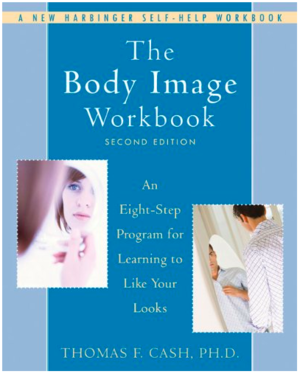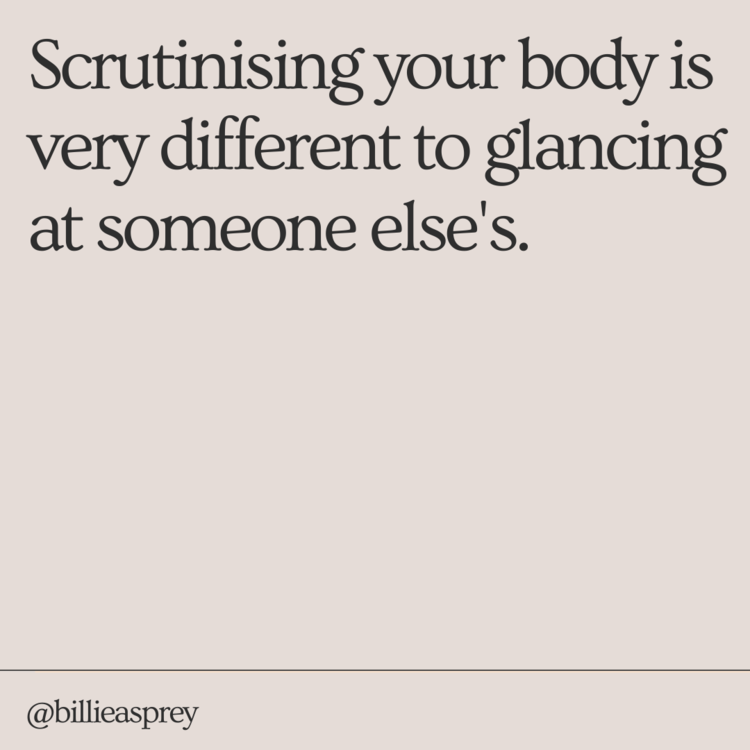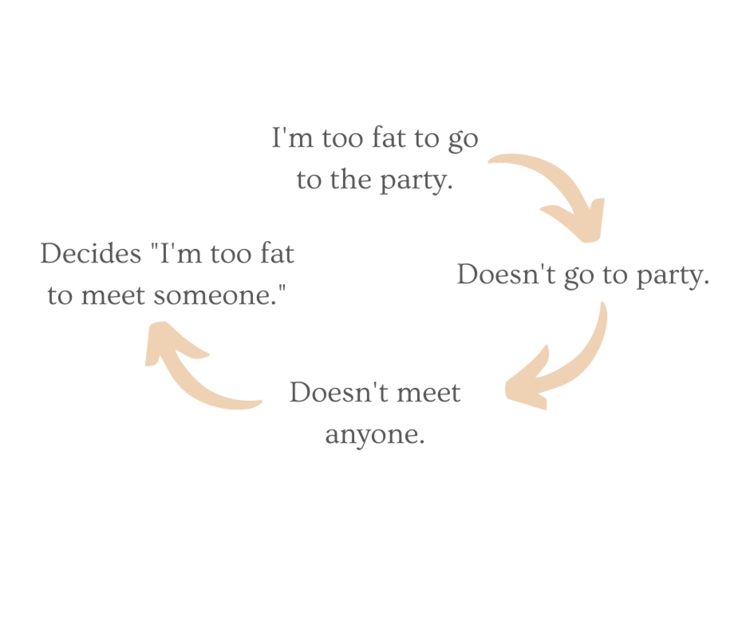Body Image Distortions
A negative body image is often accompanied by substantial negative self talk. Most of our self talk is completely irrational, which we can notice if we take a step back and break it down. The problem is that we get so emotionally involved with our appearance that it can be hard to take that step back. Instead, we make these wild mental mistakes that steer our self talk down dark and dangerous paths. The good news is though that we can turn our self talk around by recognising and eliminating these destructive mental mistakes as we make them.
I referenced Dr Thomas Cash’s book The Body Image Workbook in a recent article I shared about body image: “How to Improve Your Body Image - Tried and Tested Methods.”
This article is also largely inspired by this book. I can’t recommend it highly enough. The way Dr Cash paints body image and brings attention to our own cognitive biases is mind blowing. This article should be testament to that. These are body image distortions he discusses.
I am sure many of these will sound familiar to you. It’s confronting but also insightful to recognise the wild games our minds play.
The Beauty or Beast Distortion.
The beauty or beast distortion occurs when you think about your appearance in extremes. “I’m either the perfect weight or I am fat.”
You can address this mental mistake by viewing your appearance on a continuum. It’s not that you are either a 10/10 or else you are a 1/10; you can fall anywhere on that scale. You need not be perfect or be completely imperfect.
You can further this thought pattern by asking yourself if you judge others with only two extreme categories, or if you see them on a continuum? It’s very likely that you have friends that you don’t perceive to be super models but also aren’t awful looking. Your friends are probably just nice looking to you.
The Unfair to Compare Distortion.
The unfair to compare distortion involves pitting your appearance against some unrealistic or extreme standard. You pitch yourself against a small subgroup of people: the exceptionally attractive or those paid to look that way, rather than the average person. You may also compare only your biggest “flaws” against others, rather than comparing your strengths to that of others.
You can address this mental mistake by comparing your strengths to that of others
Look at yourself only as much as you look at others — scrutinising your body is very different to glancing at someone else’s
Ask yourself: “if I’m going to be compare then I need to be fair, so who am I more attractive than?” When was the last time you did that?
Replace “shoulds” and “musts” with less demanding language. You don’t need to be thinner. Correct your language: “it might be nice to drop a few kgs, but I look pretty good the way I am. I refuse to think ill of myself for not looking like a Victoria’s Secret Model.”
The reality is that everybody is more attractive than someone and less attractive than someone else. You don’t need to feel bad because someone else has something better than you have.
Question where these beauty ideals come from. Who are these appearance masters that we feel the need to serve? Trends and standards of beauty are ever changing. Trying to keep up is rarely a fulfilling pursuit. In my teens, the ideal was to be stick thin. Now a more athletic and curvy physique is admired. How tf does one keep up? Why bother?
Take a stance: “I refuse to buy in to societal ideals of beauty. I refuse to treat myself that way.”
Recognise that a mental compliment of someone else need not be a mental criticism of yourself. They way that someone else looks has nothing to do with the way you look. Someone else looking good doesn’t mean that you look bad.
The Magnifying Glass Distortion.
The magnifying glass distortionoccurs when you focus on an aspect of your appearance that you dislike and then exaggerate it. You commit this mental mistake when you cannot consider your looks without zooming in on one disliked feature. The magnifying glass distortion further amplifies your negative body image by preventing you from appreciating the very features that others find most attractive about you.
You can begin to correct this mental mistake by spending as much time analysing your best features as you do your '“worst.”
Adopt the “equal time rule” which states that you must spend an equal amount of time on your more positive or desirable features/traits as you do on your those things that you dislike about your body.
“I may not like my _________, but others see more to me than that feature.”
Correct your subjective descriptions. “I’m carrying a little more weight than usual is more objective than “I look huge.”
What features do others compliment you on? How does it feel to zoom in on those?
The Blame Game Distortion.
The blame game distortion happens when you incorrectly conclude that some disliked physical attribute is directly responsible for certain disappointments and difficulties that you experience. You want to blame something for your troubles and because you already see your appearance as offensive to you, it’s the convenient target. The blame game distortion sounds like: “If I didn’t look so _________, then _________ [something bad] wouldn’t have happened.”
Your appearance may have influenced some things in your life, but ultimately you are responsible for your life. You hold the power to decide how you deal with any effects that your looks may have. Read that again. Though the past has already happened, your present and future are up to you; not your appearance.
When caught in the middle of a blame game, ask yourself: “what real evidence is there that my appearance is to blame for this? And what other explanations are there?” Perhaps you weren’t in a great mood and didn’t put your best foot forward, perhaps the other person was having a bad day, perhaps there was a stronger candidate….
Sometimes all you need to do is catch yourself blaming your looks. “Here I go again, blaming my looks for ruining everything.” Leave your appearance out of it. What can you do to make things better?
Suppose you do have reasonably good evidence that your looks did cause some problem for you. Perhaps someone you swiped right for, swiped left, with nothing in your bio, just photos. Not everyone will like everything about your looks. There are guys my best friend drools over that I just don’t get. Similarly, she’s never gonna hit on my boyfriend. We have completely different ideas of attractiveness and beauty, as does everyone else! One person’s opinion is not everyone’s opinion and not everyone has to like you. * woah *
The Mind Misreading Distortion.
The mind misreading distortion leads people to believe that if they think they look bad, other’s must think the same too. It causes you to project your own beliefs onto the minds of others. You are the one observing what you don’t like about your appearance. Other people usually couldn’t care less. They probably have their own body image hang ups that they’re hoping you don’t notice. Sure, people notice what you look like. But it is unlikely they zoom in on your flaws as much as you do, and equally as unlikely that they will treat you differently because of the components of your appearance that you don’t like. Their treatment of you is much more likely to be dictated by your personality, friendliness, humour and so on, which is fortunately entirely up to you.
Ask yourself: “if my appearance isn’t what bothers people, what else could it be?” This can be confronting — people aren’t likely to be warm and friendly towards you if you do not act that way towards them. Could it be that you have been distant and withdrawn because you have been so preoccupied with what they’re thinking about your looks?
Accept reality: I’m pretty smart but I can’t mind read. You’re not correctly reading what the other person is thinking; you’re just taking your own thoughts and assigning them to the person in front of you.
Talk back to your self talk: “I need to stop thinking about what others may be thinking. Instead, I need to change what I am thinking.”
The Misfortune Telling Distortion.
The misfortune telling distortion pertains to your predictions about how your appearance will affect your future — that your physical shortcomings will have deleterious effects on your life, eg: “people at the gym will stare at me” or “I’ll never get a boyfriend if I’m overweight.” Let’s be real, life and people are much less predictable than this. Much like the mind misreading distortion, your future is much more likely to be dictated by your personality, work ethic, friendliness, outgoing nature and so on. Your physical appearance will only affect your future if you let it; that is, if you allow it to permeate your behaviour.
Realise that your pessimism may actually stem from your expectation that you’ll feel self-conscious in a given situation. Your discomfort is probably the worst thing that will happen.
Analyse the evidence. Have your pessimistic predictions always come true? Think about instances in which events turned out more favourably than you’d expected.
There is seriously only one way to find out if your predictions are correct: test them. Go to the gym. Are people staring? Yes, I completely understand this is daunting. Go with a friend, have a PT take you through a session, whatever makes you feel most comfortable. I think you’ll be pleasantly surprised to find that the people there are much less interested in your appearance than you expect.
The Beauty Bound Distortion.
The beauty bound distortion says that you cannot do things because of your looks. You forbid yourself to go places, do things or be with certain people because you think you don’t look good enough. You tell yourself you can’t wear certain styles of clothing and you deny yourself certain social or recreational activities. It sounds like “I look too _________ to do that” or “until I _________, I can’t _________.” Your behaviours end up confirming your beliefs, your self imposed constraints confirm your negative self talk and your negative self talk constrains you from living a fuller life. “I look to fat; I’m not going to the party” starts to confirm the “I’m too fat to meet anyone” which reinforces your belief that you won’t get a man. By releasing the shackles of your beauty bound distortions, you open yourself up to an array of events, possibilities and adventures that have the potential to disprove your limiting beliefs. Face it, other people who are far from being perfect physical specimens engage in the same activities that you deny yourself. Do they really look better than you? Or do they refuse to deprive themselves of involvement in life simply because they aren’t perfect?
Beauty bound distortion.
Challenging the beauty bound distortion.
Ask yourself “so why can’t I do _________? Why can’t I go to the party? Because I may not be the hottest one there? Please. It’s your discomfort stopping you; not your looks.
Ask yourself “how can I do _________? I can’t go to the gym until I lose weight can become “I can go to the gym if I remind myself that facing my nerves and anxiety is an act of courage.”
Think about other times that you have accomplished things that you first felt insecure about until you took them on and mastered them. Didn’t it feel good to overcome obstacles and succeed? You can do it again.
How do you feel when you are ruled by the beauty bound distortion — frustrated, lonely, angry, rejected? Imagine how it would feel to stand up against those feelings.
The Moody Mirror Distortion.
The moody mirror distortion can take one of three forms:
Your initial emotion is a negative feeling about your looks, and you confuse feelings with facts. “Because I feel fat, I must be fat.”
Feelings of unattractiveness about one physical characteristic spill over in to other features. The uglier you feel, the more you notice or create other imperfections in order to justify your feelings.
You start with negative feelings about something unrelated to your looks, for example being stressed out or in a bad mood. These negative emotions can set off other dormant dialogues (such as negative body image thoughts), particularly when they are tinged with a similar emotion such as shame or anxiety.
You see this often when you are moody around that time of the month, suddenly your bloating seems much worse and your self talk takes a serious downward spiral.
The key to overcoming the moody mirror distortion is recognising that the bad mood came first. Ask yourself: “was something already bothering me before I started worrying about my appearance?” If so, your appearance isn’t really the issue here. You had a stressful day and your looks can stay out of this.
It’s important to catch the distortion as soon as you notice your mood change and before it spreads. The more you let it spread, the more forceful it gets. Obsessing over your physical imperfections doesn’t fix what’s wrong. The obsessing is what’s wrong. Read that again. Catch yourself, then shift your focus on to something else. Leave the mirror and go engage in some other activity that feels better and is more productive.
Stop yourself: “I’m not feeling very attractive right now. This isn’t a good time to contemplate my looks. I’m just making myself feel worse, so I’m going to stop.”
Replace “I am” thoughts with “I feel” thoughts. “I am so fat in this bikini” becomes “I don’t feel amazing in this bikini.”
It’s highly likely that one of more of the above distortions sounds familiar to you. Our minds are really funny things. Even when we know something is happening, that we are being biased or viewing something in the “wrong” way, it doesn’t always mean we can just stop it in it’s tracks and overcome it. This is why we still get roped in to gimmicky marketing, even when we are aware of what they marketers are doing. For the distortions that ring particularly true for you, it can be helpful to journal your responses to the following questions:
What events or situations typically activate this distortion for me?
My distorted self talk often says:
To correct my distorted self talk, my new self talk will say:
This will help to bring attention to the situations, events, people or places that trigger your negative body image, then help you work through how to better respond to those triggers so that you can overcome these messy distortions and they can cease restricting your life.
Again, improving your body image is perhaps significantly more challenging than just changing your physical appearance, but it is significantly more rewarding and psychologically freeing. We can change our outward appearance as much as we want, but until we come to accept ourselves as we are, nothing will ever be good enough. I’ll leave you with this quote that Plutarch wrote of Cleopatra:
“Her beauty was not in itself so remarkable that none could be compared with her, or that no one could see her without being struck by it. The contact of her presence, if you lived with her, was irresistible: the attraction of her person, joining with the charm of her conversation, and the character that attended all she did, was something bewitching.”
— Plutarch
As Julia Baird said in Phosphorescence, “who then cared about her nose?”
Billie x





